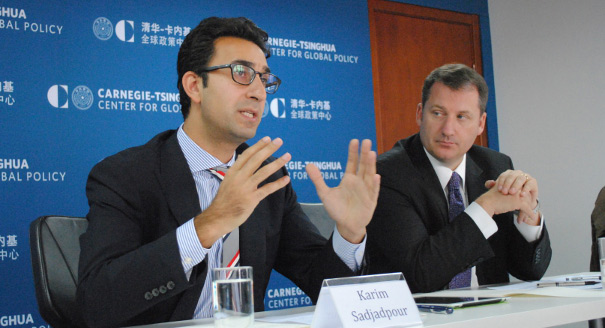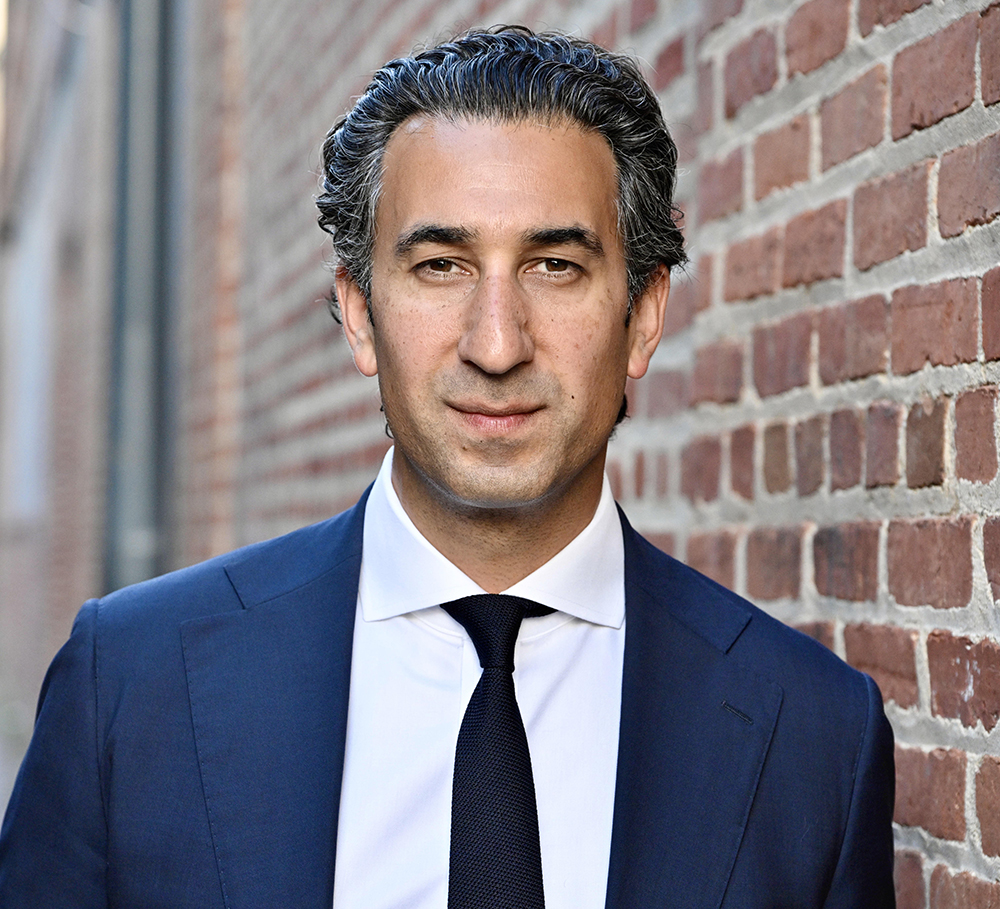{
"authors": [
"Paul Haenle",
"Karim Sadjadpour"
],
"type": "event",
"centerAffiliationAll": "",
"centers": [
"Carnegie Endowment for International Peace",
"Carnegie China"
],
"collections": [
"Iranian Proliferation",
"China’s Foreign Relations"
],
"englishNewsletterAll": "",
"nonEnglishNewsletterAll": "",
"primaryCenter": "Carnegie China",
"programAffiliation": "",
"programs": [],
"projects": [],
"regions": [
"North America",
"United States",
"Middle East",
"Iran",
"East Asia",
"China"
],
"topics": [
"Nuclear Policy",
"Security",
"Arms Control"
]
}
Iran’s Charm Offensive and Regional Implications
Thu, October 17th, 2013
Beijing
Iran’s leadership recently agreed to resume P5+1 negotiations over its nuclear program after more than a decade of economic sanctions. The phone call between U.S. President Barack Obama and Iranian President Hassan Rouhani following the meeting of the UN General Assembly in September marked the first contact between leaders of the two countries since 1979. This paved the way for formal nuclear negotiations in Geneva for the first time in four years.
Carnegie-Tsinghua’s Paul Haenle moderated a panel featuring Carnegie’s Karim Sadjadpour and Chinese experts on Iran’s nuclear program, China’s engagement in the Middle East, and potential policy outcomes.
Motivations Behind Iran’s “Charm Offensive”
Since his election as Iran’s new president, Hassan Rouhani has embarked on what has been coined as a “charm offensive” and pledged to reach an agreement on Iran’s nuclear program to end the country’s economic isolation. Sadjadpour described U.S. policymakers as cautious optimistic about Iran’s new moderate and pragmatic leader.
- Economic Problems in Iran: Sadjadpour explained how Iran’s economic crisis has motivated the regime to prioritize the country’s economic interests over ideology and pursue nuclear détente. He added that UN sanctions have been more effective than U.S. policymakers anticipated, causing a 50 percent drop in Iranian oil revenues and complicating the receipt of payments for Iranian oil exports. On top of that, Tehran’s substantial financial support to the Assad regime in Syria has added to Iran’s increasing economic duress.
- Iran’s Nuclear Intentions: Niu Xinchun, a professor at the Institute of West Asian and African Studies at the China Institutes of Contemporary International Relations, agreed with Sadjadpour that the Iranian regime is pursuing a nuclear breakout capability, similar to the Japan nuclear model, rather than trying to build and test a nuclear weapon. The regime may be willing to make substantial concessions in negotiations, Niu added. In addition, Ma Xiaolin, a former senior Xinhua news agency reporter in Kuwait, stated that the deteriorating economic situation has pushed Iranian youth (who form a large segment of the population) to call for a change in leadership. This may also contribute to Iran’s willingness to negotiate.
- Elites Resistant to Change: Niu explained that the continuing rule of hardliners like Iran’s Supreme Leader Ayatollah Ali Khameni within Iran makes rapprochement with the United States unlikely. Sadjadpour emphasized that the ruling political and military elites of Iran will continue to try and maintain control of the political, military, and judicial arenas because they believe that opening up Iran too much could bring fast and unpredictable change and instability.
Global Views of Nuclear Negotiations
While attention has been primarily on the warming of relations between Iran and the United States, Sadjadpour emphasized other key players’ interests in any kind of rapprochement. In particular, he discussed influence of domestic politics.
- Washington Mixed on Talks: Sadjadpour noted an interesting dichotomy in Washington toward engagement with Iran. On the one hand, he described the Obama administration as the most pro-engagement security team vis-à-vis Iran since 1979, largely because Iran presents Obama with an opportunity to leave a positive diplomatic legacy. However, the U.S. Congress has given no sign that it will be willing to lift sanctions unless Iran gives up its nuclear program entirely. In fact, Sadjadpour said negotiations with the U.S. Congress could be even more difficult than those with Tehran.
- China Sees a New Market: Sadjadpour stated that Beijing sees great economic benefits to a détente between the United States and Iran. He explained that the opening of Iran would result in a huge and untapped market for the export of Chinese products. It would also add several million barrels per day of oil to the global market and reduce the price of crude oil, a huge boost for the growing Chinese demand for energy.
- Israel and Saudi Arabia: Sadjadpour added that both Israel and Saudi Arabia are wary of any easing of tensions between the United States and Iran. Panelists agreed that Israel is worried about the possibility that Iran might receive significant sanctions relief without being forced to halt or dismantle its nuclear capabilities. Sadjadpour added that the Persian Gulf countries feared a loss of value as allies to the United States.
Likely Outcomes of Rapprochement
- Resistance From U.S. Congress: Congress’ reluctance to lift sanctions on Iran. Sadjadpour responded that the most difficult disagreements to overcome are between Obama and Congress in the United States and between Rouhani and Khamenei in Iran.
- Likely Outcomes: Sadjadpour proposed that a negotiated settlement on the nuclear issue might involve Iran capping enrichment and production at 5 percent, granting greater transparency of its nuclear program to international observers, and converting their stockpile of low enriched uranium to fuel rods. In return, Iran would receive some sanction relief. However, Niu said that the United States is unlikely to lift sanctions without a regime collapse. Panelists agreed that Tehran might also appeal to other countries, particularly in Europe, to weaken the coalition placing sanctions on Iran.
Discussants Included: Gu Guoliang, Wu Bingbing, Niu Xinchun, Wang Suolao, Ma Xiaolin, Li Guofu
Carnegie does not take institutional positions on public policy issues; the views represented herein are those of the author(s) and do not necessarily reflect the views of Carnegie, its staff, or its trustees.
Event Speakers
Paul Haenle held the Maurice R. Greenberg Director’s Chair at the Carnegie Endowment for International Peace and is a visiting senior research fellow at the East Asian Institute, National University of Singapore. He served as the White House China director on the National Security Council staffs of former presidents George W. Bush and Barack Obama.

